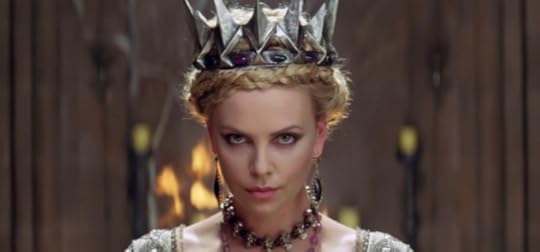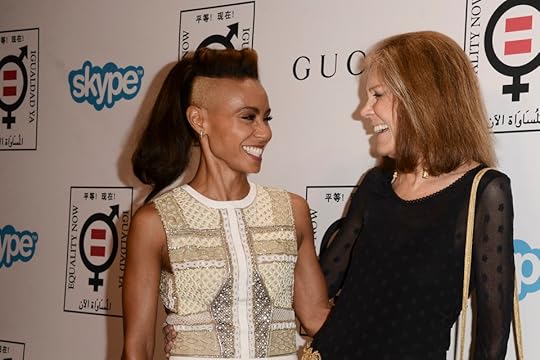How ‘Badass’ Became a Feminist Word

Here is what you’ll see when you search Google Images for the term “badass”:

Here is what you’ll see if you scroll down a little more:

And just a little more:

Keep scrolling …
Keep scrolling …
Just a little more…
Hey, look, there’s a woman! Charlize Theron, in this case, as the Evil Queen in Snow White and the Huntsman.

Which is … weird. But also unsurprising! Because the term “badass”—a noun and a verb and a compound so obvious as to be almost inelegant—has traditionally described dudes. The badass is, per one definition, “the epitome of the American male.” Someone who “radiates confidence in everything he does, whether it’s ordering a drink, buying a set of wheels, or dealing with women.” Someone who is “slow to anger” and “brutally efficient when fighting back” and who is essentially Dirty Harry or Chuck Norris or Charles S. Dutton or an iteration of the same. To be badass—to be a badass—one must, both literally and otherwise, swagger.
Related Story
But you know who else, these days, swaggers? Beyoncé Knowles and Jennifer Lawrence and Nicki Minaj and Malala Yousafzai and Ruth Bader Ginsburg and Viola Davis and Amys both Poehler and Schumer. And also, yes, Charlize Theron. “Badass” was born, in the 1950s, as an insulting if unimaginative synonym for “bully”—someone who was “bad,” and also an “ass,” was a “badass”—and it has gone through a typical cycle of de- and then re-appropriation since then, much of it related, in some way, to Clint Eastwood.
The latest adoption, however, is the thing Google so strikingly fails to account for: In its latest incarnation, “badass” describes not just men, but the ladyfolk. It doubles as an endorsement of a woman who is particularly strong, who is particularly cool, who is particularly swaggery. It’s a term of acclamation and aspiration, both for women and for a culture that is finally giving them their due. It’s a recognition that women can “radiate confidence in everything they do” just as readily as men can. Even, and especially, when they’re “dealing with women.”
And so: This week, Rolling Stone offered a profile of “Krysten Ritter: The Woman Behind TV’s Badass ‘Jessica Jones’” and The Huffington Post gushed, “Total Badass Goes on Fox News in Patriotic Hijab” and Above the Law declared, “Elle Woods Is a Badass” and Jezebel offered “10 Unbelievably Inspirational Quotes From Hollywood’s Most Badass Women.” The emcee of the Reel Works gala in New York introduced the Empire and Precious actress Gabourey Sidibe as a “badass bitch.”
It’s a term of praise and aspiration, both for women and for a culture that is finally giving them their due.The intro was a fusion of the gendered “badass” and its newer cousin, the “bad bitch”—and it was, in that, extremely appropriate to an era that celebrates women not just for their appearances, but for their accomplishments. “Badass” is similar, in some ways, to “flawless,” the term that recently moved from drag culture to pop culture as another feminist acclamation. “Flawless,” Parul Sehgal wrote in an essay about the term, “has a celebratory sheen: Women apply it tenderly, reverently to one another—and triumphantly to themselves.” And yet: “Flawless” is, for the most part, about appearance. Its celebrations are largely the results of aesthetic judgments. Its praise is of the effort that goes into creating the illusion of effortlessness.
“Badass,” for its part, takes that celebration and applies it very specifically to a person’s behavior. According to “the unspoken rules of being a badass,” one realizes one’s badassery not through looking a certain way, but through acting a certain way. (Rule 1: “A badass does not talk about being a badass.” Rule 2: “A badass does not try to be a badass or look tough.” Rule 3: “A badass stays true to themselves, always.” Rule 4: “A badass does not give up.” Rule 5: “A badass is not a jerk.”) Katniss Everdeen, Imperator Furiosa—badasses both, despite and because of blood and mud and sweat. The badass is womanly in a supremely unladylike kind of way.
She is also independent but not arrogant, revolutionary but not ornery. Maybe most importantly, she is likable expressly because she does not care about being liked. She is Viola Davis, saying what needed to be said on the Emmy stage. In an essay about celebrity and the cult of female likability, Arielle Bernstein noted,
It’s impossible to argue that female likability is based on good manners when today’s fawned after starlets are anything but polite and well behaved. Stars like Amy Schumer, whose brand of raunchy, in-your-face humor, much of it with a strong feminist bent, has been heralded time and time again as this year’s “It Girl” and actresses like Jennifer Lawrence, Tina Fey, and Amy Poehler are lauded for being charmingly sassy and consistently speaking their minds. When J-Law speaks out against the Hollywood pay gap and says, “I’m over trying to find the ‘adorable’ way to state my opinion and still be likable! Fuck that,” she is both giving the middle finger to the establishment, and also performing a different kind of likability.
Which is another way of saying: Those women—loved by the public for, among other things, being true to themselves—are totally badass.









Atlantic Monthly Contributors's Blog
- Atlantic Monthly Contributors's profile
- 1 follower



